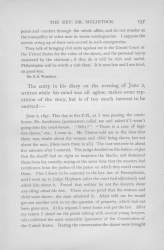Record Data
Transcription
June 2, 1847. This day at five P.M., as I was passing the courthouse, Mr. Sanderson (postmaster) called me and asked if I wasn't going into the court-house. "Why?" "There is a case of fugitive slaves," etc. I went in. Mr. Thorne told me at the door that there was doubt about the woman and child being slaves, but not about the man, (there were three in all.) The case was over in about five minutes after I entered. The judge decided on the habeas corpus that the sheriff had no right to imprison the blacks, and dismissed them from his custody, saying at the same time that the masters had certificates form the justice of the peace on which they could remove them. This I knew to be contrary to the late law of Pennsylvania, and I went up to Judge Hepburn (after the court had adjourned) and asked him about it. Found that neither he nor the lawyers knew any thing about the law. There was no proof that the woman and child were slaves; the man admitted it. Adair told me he would get out another writ to try the question of property, which had not been gone into. At his request I went home and got the law. After my return I stood on the porch talking with several young lawyers, who exhibited the most miserable ignorance of the Constitution of the United States. During the conversation the slaves were brought out, and before the writ of habeas corpus had been returned by the judge. The free blacks, seeing their fellows about to be carried away into interminable bondage, made a rush and carried off the woman and child. In the melee one of the slaveowners, named Kennady, was badly hurt.
As I was coming home the last time I heard, near the courthouse corner, several person, saying, "Let her go, she has done nothing," and turning I found a man hauling off an aged colored woman. She said she had only tried to get "her old man out," and I told the officer that if "she had done nothing, and he arrested her illegally, I would see justice done her." I then came home.
After tea I heard that I was charged with inciting the riot, and that a writ was out against me. All sorts of stories were told, and many of the students were very much excited. They held a meeting on the chapel steps at seven P.M. Emory went there and said a few words; when I heard of it I went out, and gave them the true account; told them to go down and ask any decent person they chose and they would find it confirmed. They behaved very well. It was stated in the evening that our house would be mobbed. The town was in great excitement, and it was thought best for my family to sleep at Dr. Emory's.
The truth of the case was, that my human and Christian sympathies were openly exhibited on the side of the poor blacks, and this gave mortal offence to the slaveholders and their confreres in the town.






